Why do gooseberries shed berries and leaves and how to deal with it
Gooseberry valued for their ease of care and rich harvest. Thorny bushes take up little space and do not require special attention. Jams and preserves are prepared from the fruits, compotes and vitamin drinks are made. However, sometimes even the most productive and strong plants begin to dry out and drop their berries. This may be accompanied by yellowing of the leaves and deformation of the fruit. Why gooseberries fall off on a bush and what to do about it, we will tell you in the article.
Why do gooseberries fall off before they ripen?
There are several reasons for the shedding of unripe berries. The most common of them are agricultural errors, diseases and pests..
The first group includes errors in irrigation and feeding, irregular loosening and mulching of the soil. Sometimes berries fall off due to excess or lack of moisture or deficiency of microelements. It happens that fruits fall for several reasons at once. For example, when the bush was not watered or fertilized for more than 3 weeks.
From diseases allocate septoria and rust. They occur due to hot and rainy weather and contaminated soil. If the disease is not detected in time and treatment is not started, most of the berries will end up on the ground.
From insect pests can be found on gooseberries moth butterfly or spider mite. They suck out the nutritious juice from the plant, which disrupts the shrub's metabolic processes and weakens its immunity.
Also berries fall off without ripening due to climatic features of the region, for example, severe frosts and frequent winds. This is especially true for central Russia and the north.
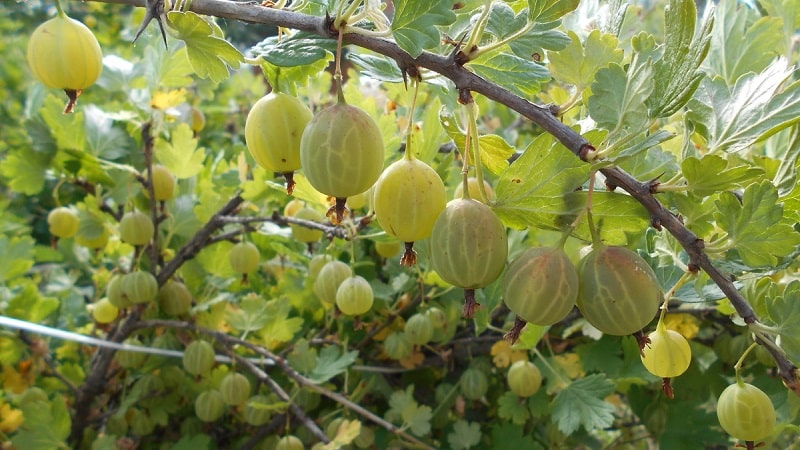
What to do if berries and leaves fall
If there are 2-3 berries on the ground, it’s not scary. But if the fruits fall abundantly and often, then you need to take action.
Rules of care
First of all, gardeners pay attention to the rules of care. Adjust the watering and fertilizing regime if necessary, and also Regularly loosen the soil and remove weeds.
Watering
Frequency and abundance of watering depend on the weather. If it rains often in summer, it is enough to water the gooseberries once every 3 weeks. In dry weather, the plant is moistened once every 10 days. They use drip irrigation and sprinkling method. The water is preheated in the sun. Watering with cold water can provoke the development of diseases. To prevent water from getting on the fruits and leaves, the stream is directed directly under the root.
Attention! There is an easy way to determine whether a bush needs watering or not. Take a lump of earth near the roots and squeeze it with your hand. If the soil crumbles, then the moisture level is fine.
When watering, water should penetrate to a depth of 40-45 cm. To do this, grooves 15 cm deep are dug along the diameter of the gooseberry, into which water is poured. Before this, the soil is loosened so that a dense crust does not form on its surface.
Top dressing
Often The reason for the shedding of berries lies in the deficiency of microelements. If the gooseberries have not been fertilized with organic matter for more than 2 years, a solution of mullein (1:10) or bird droppings (1:20) is added under the bush. They replenish the lack of nitrogen in the soil and increase the frost resistance of the bush. It is recommended to carry out procedures early in the morning so as not to burn the roots of the plant. When feeding mullein solution per bush takes 5 liters, bird droppings - 2.5 liters.
If there is a lack of potassium and phosphorus, gooseberries are fertilized with a mineral complex. The preparations “Gumi-Omi”, “Aminozol”, “Magic Leika” are used - they increase productivity, eliminate the cause of berry falling, and protect the bush from diseases and pests. When using mineral complexes, gardeners follow the dosage and preparation recommendations. The interval between feedings is at least 20 days.
Disease and pest control
If gooseberries wither and fall off, the reasons lie in diseases and pests. The causative agents of fungal and bacterial diseases live in the soil or plant debris and enter the bush with water or gardening tools.
The larvae of insect pests live on neighboring plants and are carried by the wind. Leaves may turn yellow and fruits may drop.
Rust
Rust is a fungal disease that affects not only fruits, but also stems, leaves, and ovaries.. It is found on young and mature shrubs and actively spreads in rainy and hot weather. Orange-brown spots appear on the plant, which when opened look like glasses.
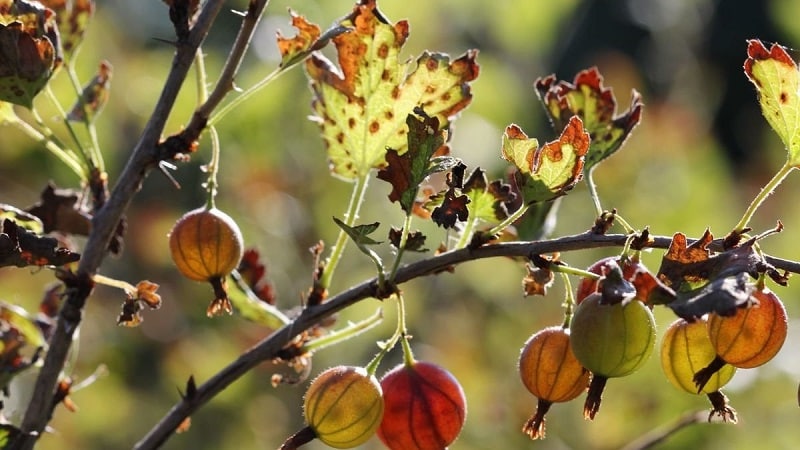
Stricken the leaf turns red and falls off. Next, unripe fruits fall off, and then the whole bush dies. To combat rust, use a solution of Bordeaux mixture (10 g of substance per 10 liters of water) or the drug “Oxychom”.
Septoria
Sometimes it seems that the gooseberries are covered with frost - this is white spotting, or septoria. Gray-brown spots with a yellow rim form on the leaves and berries. Septoria disease first affects the lower part of the bush, then slowly spreads to the entire plant. With time the spots are getting bigger and turn white.
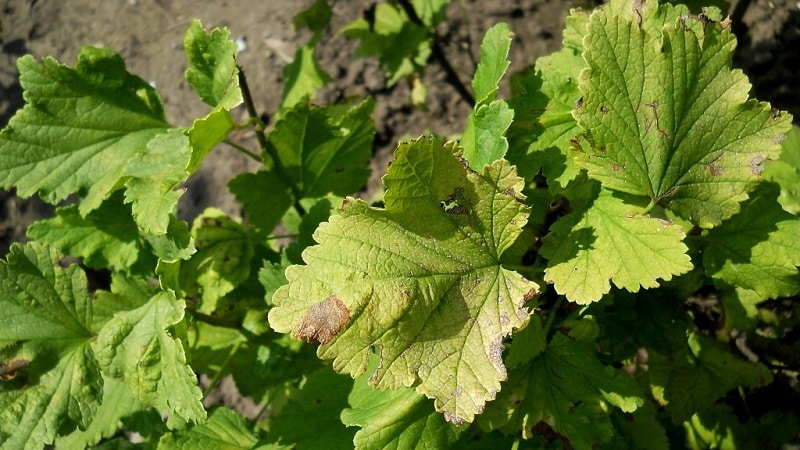
The disease especially loves weakened plants and affects bushes with weak immunity.. To combat white spotting, remove all affected leaves and shoots and burn them. The remaining parts of the plant are sprayed with “Fitosporin” or copper sulfate.
Attention! Preventive measures help protect gooseberries from falling berries and diseases. Summer residents recommend planting bushes at a distance of 2 m from each other, regularly removing weeds and loosening the soil. Diseases love overgrown and unkempt areas, so Gooseberries are pruned annually and form - remove old and dry shoots.
Alternaria blight
Alternaria blight occurs in late spring. Affected shoots and leaves become covered with light and yellow spots with a silvery coating, which turn brown over time. The berries become deformed, lose their elasticity and juiciness, and fall off. It is impossible to eat such unripe fruits - the pulp becomes very sour.
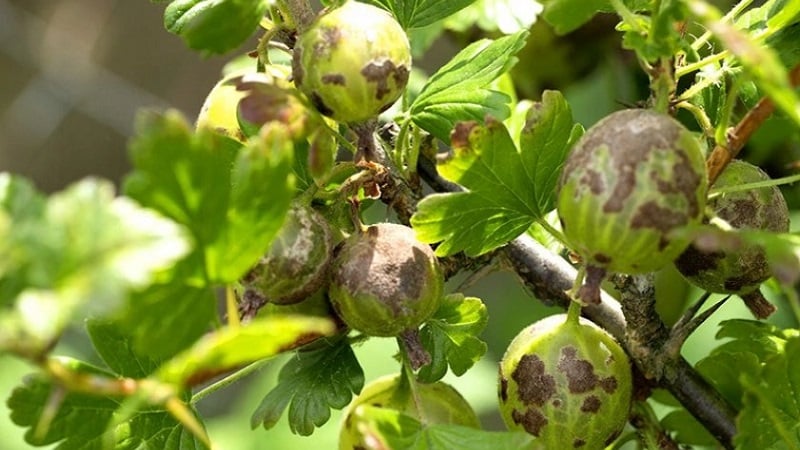
When the first signs of infection appear, the gooseberries are sprayed drugs "Bravo", "Ordan" or "Quadris". Fungicides treat the plant and prevent new symptoms from appearing. It is important to treat the bushes at least 2 weeks before harvest.
Sawfly
Sawfly caterpillars are capable of destroying the entire crop - they gnaw the leaves of the plant down to the very veins. The berries grow small, unripe, and some of them are formed prematurely. Shoots slow down in growth, gooseberry immunity and winter hardiness decrease.
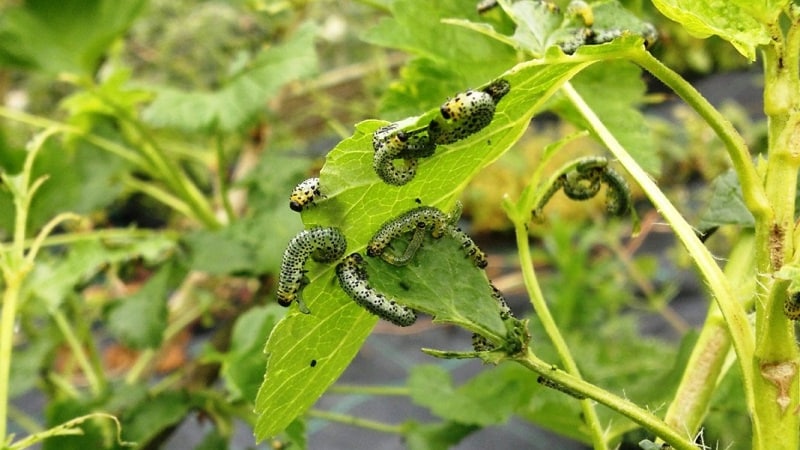
It is easy to recognize the sawfly - the caterpillar reaches 1 cm in length, the color is greenish-blue or gray. Lives on the outer and inner sides of leaves, loves damp and cool weather. To combat the pest, use the drug “Lepidocide” (25 g per 10 liters of water) or treatment with the “Iskra” product.
Moth
Both moth caterpillars and adult moths are dangerous for gooseberries.. The pest is frost-resistant; at the end of March it appears on the bushes and eats the leaves. If measures are not taken in time, the moth will destroy the entire gooseberry crop and move to neighboring bushes.
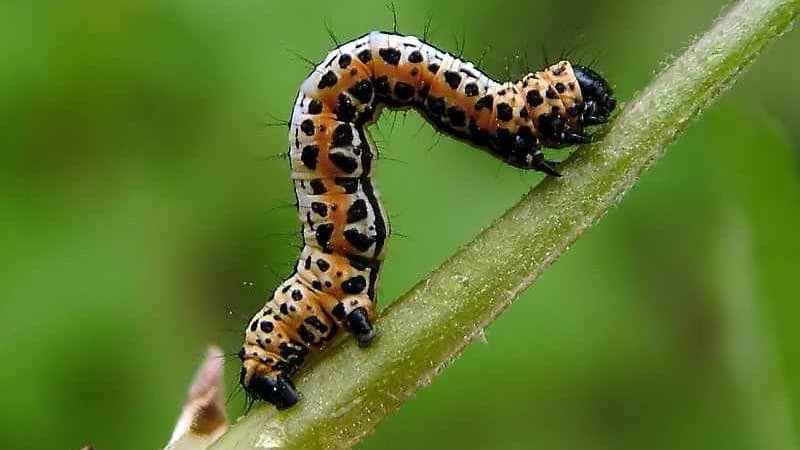
For preventive purposes, an ash solution is used: 3 kg of dry matter is dissolved in 10 liters of water and sprayed on the bush. The medications used for medicinal purposes are Actellik, Iskra, and Karbofos.
Currant borer
The borer affects not only red and black currants, but also gooseberries. Appears in the garden in late May or early June. Gold borer larvae gnaw shoots, which disrupts metabolism. Leaves and fruits lack nutrition, they dry out and fall off.
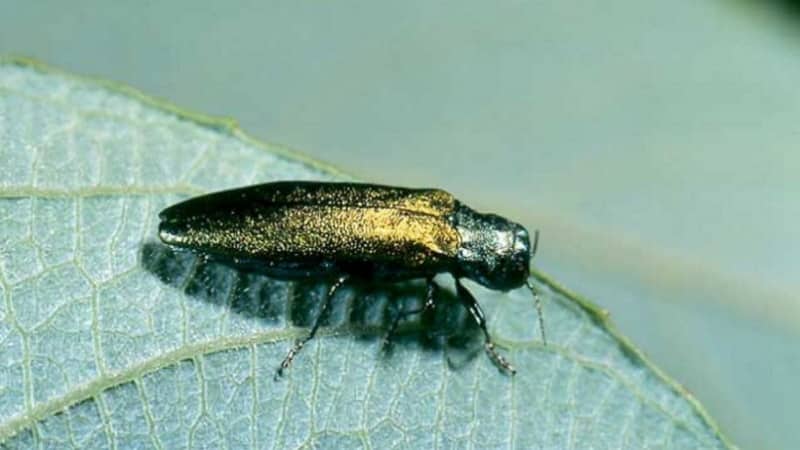
If currant borer is detected, it is recommended to burn all damaged shoots and treat the plants with Gomelin 2-3 times with an interval of 7 days. Before the procedure, water the gooseberries generously and loosen the soil.
Attention! An effective and proven folk remedy is tobacco infusion. 1 kg of tobacco dust is poured into 10 liters of water and infused for 24 hours. Spray gooseberries in dry weather.
Mite
If gooseberries turn yellow and crumble, the cause may be spider mites.. A small greenish bug sucks the juice from the plant. Over time, gardeners notice that the bush dries out, the shoots lose color and elasticity, the fruits turn yellow and fall off.
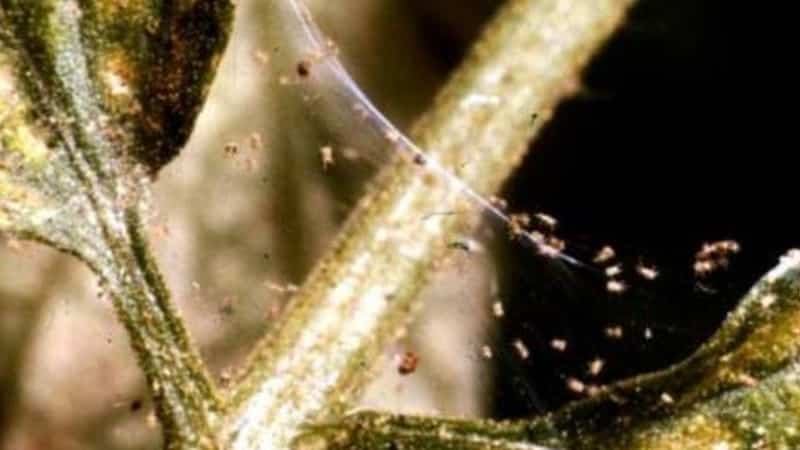
It is difficult to detect spider mites - they blend in with the color of the leaves, so gardeners carefully examine the plants, carefully lifting each leaf. A solution of copper sulfate or “HOM” helps in the fight against insects. Treatment is carried out every 2 weeks.
Aphid
Small white or green insects live in colonies. They are found on the inside of the leaf. Aphids are dangerous because they multiply quickly and are immune to folk remedies. The leaves become covered with yellowish spots, the berries do not have time to ripen and begin to fall.
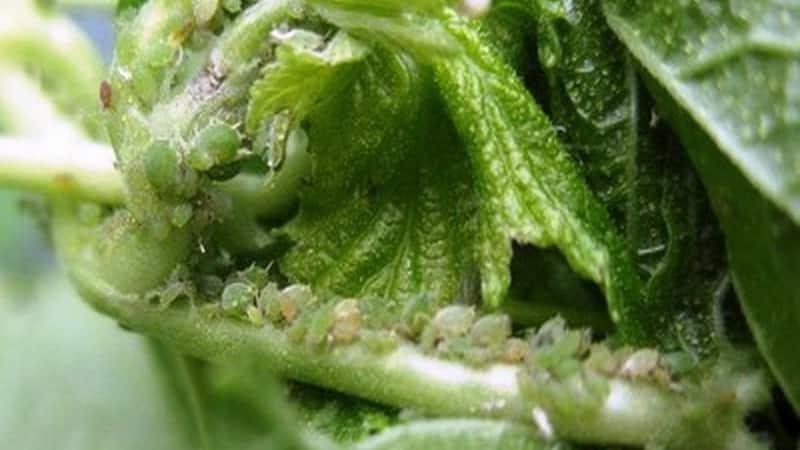
You can help gooseberries with medications "Decis", "Fufafon" or "Iskra". They stimulate fruit ripening and strengthen the immune system. It is also recommended to water gooseberries with boiling water in early spring to kill aphid larvae.
Conclusion
Gooseberries can dry out and disappear for several reasons: lack of nutrition and moisture, disease, or the appearance of insect pests on the bushes.
Experienced gardeners recommend regularly inspecting plants and starting treatment at the first symptoms. It is also important to feed the plant with organic and mineral fertilizers and water it with water heated in the sun. It wouldn’t hurt to take preventive measures - they help gooseberries ripen no problem.